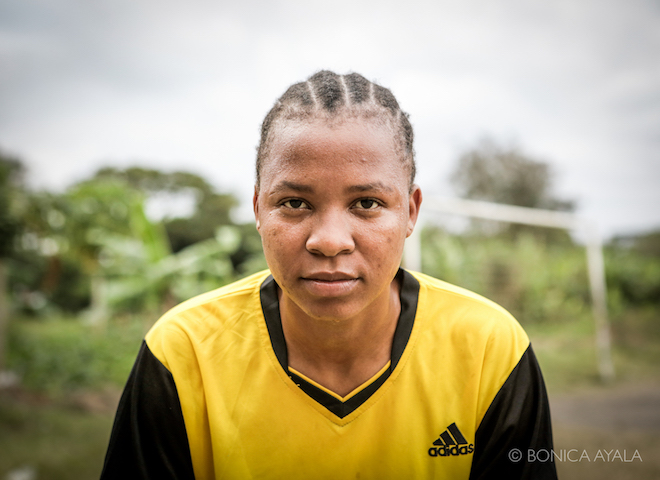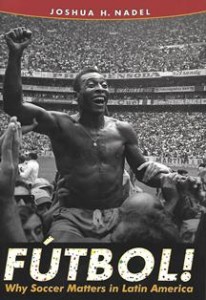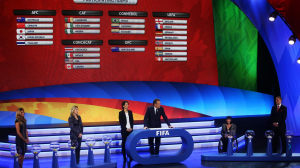
I recently went on a cinematic journey that took me from women’s soccer in Zanzibar to a failed stadium-and-entertainment complex in Buenos Aires.
My travel agency, so to speak, was the Football Scholars Forum. On February 23 it held an online discussion of two low-budget, high-return documentary films. (A recording of the event can be found here. Audio quality improves significantly around the 20 minute mark.)
“New Generation Queens” by Megan Shutzer tells the story of a Zanzibari women’s team. The documentary follows the compelling lives of younger and older women to cast light on the culture of the women’s game on the East African island, which is 99% Muslim. The 50-minute film alternates interviews with passionate players and determined organizers with footage of training sessions on rudimentary pitches. As an historian, I especially liked the remarkable 1988 footage of a Swedish team playing against a local team: the first official women’s game in Zanzibar! After the set up, the film’s main story line becomes the New Generation Queens’ journey to mainland Tanzania for a major tournament. Only the younger players participate in the Under-15 event, an important recruiting venue for the Tanzanian national side. Shaba “Messi” has a lot riding on this competition.
“Ciudad Deportiva—El Documental,” co-produced by Alex Galarza and four Argentine journalists, tells the story of Boca Juniors’ failed attempt in the 1960s and early 1970s to build a 150,000-seat stadium and recreational complex. The 45-minute documentary combines rich archival footage with still photography and interviews, to reconstruct the history of a monumental sports and urban development project. Focusing on Boca Juniors, one of the most popular clubs in the fútbol-mad city (cf. River Plate, Velez, San Lorenzo, among others), and their influential, albeit dodgy president, Alberto Armando, “Ciudad Deportiva” uncovers multiple and complex links between soccer, politics, and urban history in the mega-city of Buenos Aires.
The two enterprising film makers bring impressive academic credentials to their projects. Galarza has a PhD in Latin American History from Michigan State (where I had the distinct pleasure of serving on his doctoral committee), and is currently a Postdoctoral Fellow at Haverford College. Shutzer has a BA from Harvard, did graduate work at Stanford, is fluent in kiSwahili and works in development.
At the Football Scholars Forum, the pair explained the genealogy of their (first) films, narrative choices and production techniques, as well as approaches to film distribution. Notably, Galarza and Shutzer emphasized their commitment to collaborating closely with local people in the filmmaking process. Both spent years doing fieldwork in Buenos Aires and Zanzibar: nurturing relationships, listening to their interlocutors, building trust, and, of course, playing soccer.
The numerous differences between the films make them intriguingly complementary. “Ciudad” is a historical tale told in Spanish by men (though a female narrator) linked to one of the world’s most famous football clubs. “New Generation Queens” is a contemporary story that centers Swahili women’s voices and experiences located at the distant periphery of the global game.
I highly recommend both films. In a glut of English-language soccer media content, these documentaries stand out for their originality and production value. I also intend to use them in my classroom to challenge stereotypes about Muslim African women and to raise questions about the politics of stadium development, past and present.
Tag: women’s football
Rethinking the 2015 Women’s World Cup
On December 1, 2015, the Football Scholars Forum held its 33rd session. The Michigan State University-based online think tank pre-circulated a shared list of readings that formed the basis for a wide-ranging, highly engaging discussion about the impact and aftermath of the 2015 FIFA Women’s World Cup.
Thirteen fútbologists from the United States, Canada, Britain, Argentina, and Lebanon went well beyond the usual focus on the U.S. triumph (its first world title since 1999). The group reflected on the media coverage and scholarly writing about the tournament. Gender discrimination at both FIFA and national FA levels brought out a collective agreement about the dire need for meaningful institutional reform and for much greater funding of women’s football.
Partly reflecting the participants’ interests and expertise, the women’s game in Latin America and the effect of global inequalities attracted considerable attention. Also, the technical, tactical, and physical aspects of the game on Canada’s plastic pitches was scrutinized. Some participants celebrated the individual magic of Marta (Brazil), Necib (France), and Rapinoe (USA) and of teams like Colombia. Others noted the detrimental impact of certain (male) coaches on the games and seemed more critical about the overall playing styles.
I was shocked to learn that in Mexico the most reliable venue for watching Women’s World Cup matches was the local Hooters franchise. Seriously.
In thinking about the aftermath of the World Cup, the group was reminded of the accomplished Australian team that went on strike shortly after the tournament in pursuit of a decent wage. Gaby Garton in Buenos Aires related her experiences of playing in the most recent Copa Libertadores femenina. Her intervention personalized the story of women’s football, past and present: it is not a story of linear progress and perpetual improvement. In fact, it is very much a story of ebb and flow. Clearly, so much work remains to be done, on and off the field.
An audio recording of the session is available here.
 How does football shape national narratives in Latin America? Why is the game so closely tied to masculinity and femininity? How can studying fútbol advance our understanding of Latin American history? These and other questions were part of the Football Scholars Forum recent discussion of Joshua Nadel’s Fútbol!: Why Soccer Matters in Latin America.
How does football shape national narratives in Latin America? Why is the game so closely tied to masculinity and femininity? How can studying fútbol advance our understanding of Latin American history? These and other questions were part of the Football Scholars Forum recent discussion of Joshua Nadel’s Fútbol!: Why Soccer Matters in Latin America.
The author, an assistant professor of Latin American and Caribbean history at North Carolina Central University, shared his experience of writing a book that the publisher expected to have cross-over appeal. In addition to tackling questions from the thirteen participants online, Nadel also suggested future directions for research on Latin American fútbol.
An audio recording of the event can be downloaded here.
The next gathering of the Football Scholars Forum will be on March 26 for a paper on Zambian football by Hikabwa Chipande, a PhD candidate in African history at Michigan State University. For more information about this event, please contact Alex Galarza.
The Women’s Game: Global Perspectives
Last Saturday’s 2015 Women’s World Cup draw in Ottawa briefly took the global media spotlight away from the men’s game. And from the players’ gender discrimination lawsuit against FIFA and the Canadian Soccer Association for staging matches on artificial turf rather than natural grass.
The prominence of the women’s game in the sport-media-industrial complex happens so rarely, and tends to be so fleeting, that the Football Scholars Forum, the online fútbol think tank based at Michigan State University, decided to devote its final event before the holiday break to a thorough discussion of the state of the women’s game internationally, both on the pitch and in the scholarly literature.
This veritable intellectual pelada (pickup game) takes place on Thursday, December 11, at 2pm Eastern U.S. Time (-5 GMT). To jumpstart the Skype discussion, eminent scholars of the game have written pre-circulated blog posts on the FSF website.
Click here to read “When Two Elephants Fight, It is the Grass That Suffers” by Jean Williams (DeMontfort University, @JeanMWilliams).
Click here to read “Marimachos: On Women’s Football in Latin America” by Brenda Elsey (Hofstra University, @politicultura) and Joshua Nadel (North Carolina Central University, @jhnadel).
Click here to read “The National Teams We Know Nothing About” by Gwen Oxenham.
Click here to read “A Pitch of Her Own” by Martha Saavedra (@tricontinental)
This is not the first time that FSF has delved into aspects of the study and play of women’s football. In 2011, just before the last Women’s World Cup, Cynthia Pelak and Jennifer Doyle facilitated a vigorous session (click here for details and audio). A second gathering a year later pivoted around Jun Stinson’s short documentary film, The 90th Minute (click here to listen to my interview with the filmmaker), and featured an intervention by Gwen Oxenham, author of Finding the Game (click here for audio).
To participate in the December 11 FSF event via Skype, please contact Alex Galarza on Twitter (@galarzaalex) or by email at galarza.alex AT gmail. See you on the virtual pitch!
